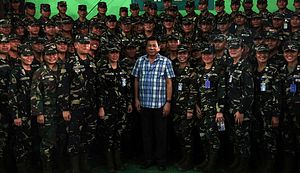Last week, we saw the appointment of a new Philippine military chief – the seventh individual to occupy the position in less than four years. While the appointment was expected and just the latest of several personnel changes we have seen in this position under Philippine President Rodrigo Duterte, the new shift does bear watching in terms of how it may affect the country’s security.
Under Duterte’s tenure, we have seen a mix of continuity and change with respect to Philippine security. This is evident in aspects such as the challenges being prioritized, the budget areas of focus, and personnel. This has manifested itself in various ongoing developments, be it the direction of the ongoing Philippine military modernization or the relative attention to its foreign defense alignments.
One of the key developments that had been in focus in recent weeks was the appointment of a new chief of staff of the Philippine military, the Armed Forces of the Philippines (AFP). The need for a new appointment arose out of the fact that the AFP chief of staff, Noel Clement, who had assumed the position in September last year, had reached the mandatory military retirement age of 56. Philippine officials indicated last month that a shortlist of potential successors had been drawn up and readied for approval in time for a transition in January.
Last week, we finally saw the appointment of a new AFP chief of staff. Felimon Santos Jr., currently the commander of the Eastern Mindanao Command (EastMinCom) in the southern Philippines. He officially assumed the post over the weekend from Clement in a scheduled joint turnover of command and retirement ceremony on January 4 at Camp Aguinaldo in Quezon City, after Duterte had officially designated him the successor in a letter directed to Defense Secretary Delfin Lorenzana on January 2. Santos is the seventh military chief to be appointed during Duterte’s tenure, and he is the fifth of the candidates to be from EastMinCom.
With Santos’s appointment, the focus will shift to the impact his tenure might have on the Philippine military. In his speech, Santos said that the first priority would be to end local armed conflict with communists, which he expected to be completed before the end of Duterte’s single six-year term in 2022. He also indicated that the military will continue its efforts to thwart terrorism and to support efforts by law enforcement and government agencies involved in the conduct of the war on drugs.
But Santos will also have to contend with a range of other strategic priorities and unexpected developments. With respect to the former, the South China Sea, which notably did not get a direct mention in his remarks apart from a general reference to sovereignty and territorial integrity, remains a concern for the Philippines in spite of Duterte’s initial warming of ties with Beijing. And on the latter, a case in point is the fact that Santos has already had to deal with the issue of how to ensure the security of Filipinos in Iran and Iraq in response to rising U.S.-Iran tensions. With no shortage of developments in this respect, Santos’ tenure, which, pending a potential exception, is set to last around seven months as he turns 56 on August 3, will be important to watch in the months that follow.

































